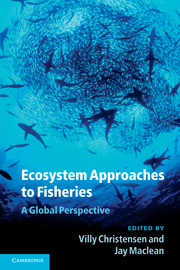Book contents
- Frontmatter
- Contents
- List of contributors
- Foreword
- Preface
- Acknowledgments
- 1 Introduction: toward ecosystem-based management of fisheries
- I Life in the oceans
- II Evaluating impact on marine life
- 5 How much fish is being extracted from the oceans and what is it worth?
- 6 Fishing down food webs
- 7 Aquaculture up and down the food web
- 8 Beyond food: fish in the twenty-first century
- 9 The shifting baselines syndrome: perception, deception, and the future of our oceans
- III Managing living resources
- IV The human side
- V Impacting policy
- Index
- References
8 - Beyond food: fish in the twenty-first century
Published online by Cambridge University Press: 05 June 2012
- Frontmatter
- Contents
- List of contributors
- Foreword
- Preface
- Acknowledgments
- 1 Introduction: toward ecosystem-based management of fisheries
- I Life in the oceans
- II Evaluating impact on marine life
- 5 How much fish is being extracted from the oceans and what is it worth?
- 6 Fishing down food webs
- 7 Aquaculture up and down the food web
- 8 Beyond food: fish in the twenty-first century
- 9 The shifting baselines syndrome: perception, deception, and the future of our oceans
- III Managing living resources
- IV The human side
- V Impacting policy
- Index
- References
Summary
The earliest interactions between human beings and the marine environment are through the human appetite. Modern humans, i.e., Homo sapiens, began consuming seafood at least 164,000 years ago on the shores of what is now South Africa, as evidenced by shell middens containing the remains of brown mussels, giant periwinkles, and whelks (Marean et al., 2007). Similar remains were found in 125,000-year-old middens along the Red Sea coast of East Africa, in what is now Eritrea, where humans enjoyed meals of oysters, crustaceans, and other shellfish (Walter et al., 2000). They also briefly consumed the flesh of the giant clam Tridacna costata, which they collected from the reefs. But their clambakes did not last. Shortly after human arrival, T. costata nearly disappears from the fossil record – the first documented case of eradication through overfishing (Richter et al., 2008).
Today, our hunger for seafood continues, and so do its consequences. Seafood consumption is on the rise globally. The US now consumes almost five times more fish than it did 100 years ago (~2.2 million tonnes in 2004 compared to ~500,000 tonnes in 1910, NMFS, 2006), and Chinese consumers are now eating almost five times more seafood per capita than they did in the early 1960s (25.4 kg/person in 2005 compared to 4.8 kg/person in 1961, Halweil and Mastny, 2006).
- Type
- Chapter
- Information
- Ecosystem Approaches to FisheriesA Global Perspective, pp. 120 - 127Publisher: Cambridge University PressPrint publication year: 2011



